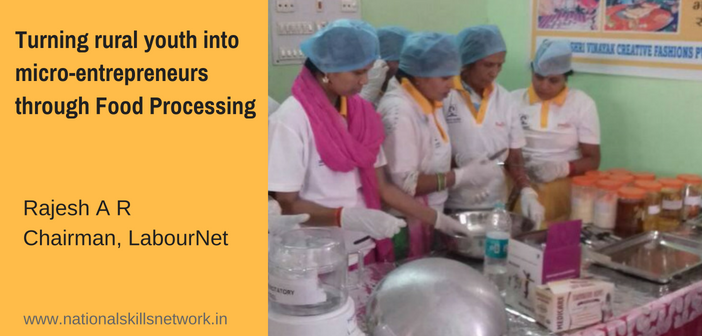The health conscious urban population has created a substantial market for nutritious food options, sourced from local communities. With the rise in disposable incomes and changing lifestyles, the demand for processed food is on the rise. Increasing awareness about the benefits of seasonal fruits such as Custard Apples, Wood Apples, Jackfruits or Jamun fruits has increased the demand for not just fresh fruits but also products that can be consumed off-season. Due to lack of basic facilities like ware housing, cold storage, preservation techniques and packaging, many farmers end up wasting their valuable produce without access to larger markets, eventually migrate to cities for new livelihood opportunities. This type of migration disturbs the entire ecosystem of local horticulture since there is no awareness and support to turn these farmers into micro-entrepreneurs.
According to the ASSOCHAM – Grant Thornton joint study on ‘Food Retail: Investment: Infrastructure,’ by 2024, the Food Processing sector is expected to employ 9 million people in India, and is expected to generate about 8,000 direct and 80,000 indirect jobs in the state. This projection implies a huge opportunity for employment and entrepreneurship in the Food Processing sector, provided we take care of the following to control rural migration:
Awareness and training in core domain skills
Rural youth, who are potential migrants, comprise a mix of school and college dropouts, graduates without proper access to skilling programs and job-oriented training. Hence, they fail to understand and appreciate prospects for gainful employment through local farming. Though they come from farming families, they don’t see an opportunity to fulfill their aspirations through farming. Horticulture could transform their lives if they are trained as per industry requirements and provided necessary linkages to set up small units of processing and packaging seasonal fruits.

Storage and warehousing
Perishables seasonal fruits need immediate cold storage facilities within the vicinity of the farms. If the farmers are educated about the latest scientific techniques and cost-effective ways of storage, they would not get distressed about wastage and loss of income. They can form co-operatives and communities to pool in resources and make the trained youth responsible for setting up basic infrastructure.
Food processing units
A complete unit that can take care of end-to-end processing requires a team of workers who are aware of all aspects of hygiene, food safety norms and compliance standards and regulations. They also need to adhere to these standards to avoid losses during packaging and transportation. Often, there is a tendency to rely on middlemen to ease up the process. This can be avoided, if the farmers are in complete control of managing the supply chain.
Funding and access to capital
This can be addressed by facilitating linkages to working capital through many government and private sector schemes. This includes Prime Minister Employment Generation Programme (PMEGP), ASPIRE (A Scheme for Promoting Innovation, Rural Industry and Entrepreneurship), SFURTI (Scheme of Fund for Regeneration of Traditional Industries), Credit-Linked Capital Subsidy Schemes, Coir Udyami Yojana Credit Guarantee Fund Scheme etc.
Agri Udaan is another option which focuses on catalyzing scale-up stage Food and Agribusiness startups through rigorous mentoring, industry networking and investor pitching. Micro-entrepreneurship is also being enabled by initiatives such as the Micro Units Development and Refinance Agency, or MUDRA, the government’s small entrepreneur financing programme.
Forward and backward linkages
Many farmers need handholding when it comes to creating these linkages. Right from the availability of the raw material (fresh seasonal produce) to reaching the right markets, there is need to plug in many gaps in the supply chain. Besides access to funding, they need assistance in running the processing unit, arranging logistics, documentation and legal compliance, communicating with the customers, coping with the business uncertainties and sometimes natural calamities. Hence, participation in various government schemes can be effectively facilitated by NGOs, Vocational Training Providers, Livelihood enablement companies and similar organizations.
Empowerment through digital skills and social media
Training in basic digital technologies such as use of mobile apps and the Internet is an essential element of any startup. We need to impart social media skills in order to help them market their products. Along with entrepreneurship and basic managerial skills including communication, we can help them become confident and independent in terms of managing accounts, finances and collaborating with a network of banks, suppliers, distributors etc., which is essential for growing their business.
With awareness, education and training, rural migration can be controlled in a big way. Food Processing is a high-growth industry that can create, sustain livelihoods and show a path to prosperity for rural youth, provided they are rightly guided, facilitated and supported. This can create rural employment locally and this will reduce migration to cities, thereby contributing to the growth of the rural economy. Developing sustainable rural livelihoods through micro-entrepreneurship will definitely ensure rural job creation, better productivity and increase in incomes.
This is a guest article by Rajesh A. R, Chairman, LabourNet Services India Limited.
The views expressed above belong to the author. NSN does not subscribe to the views and opinions expressed in the article.












